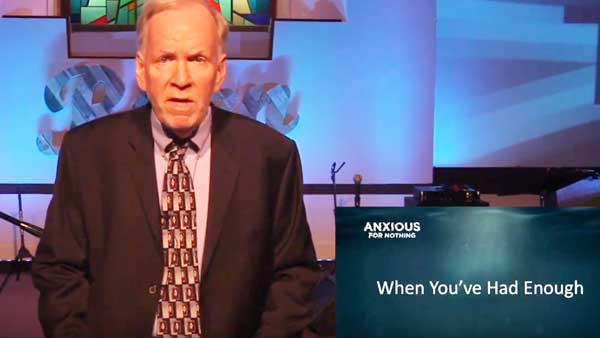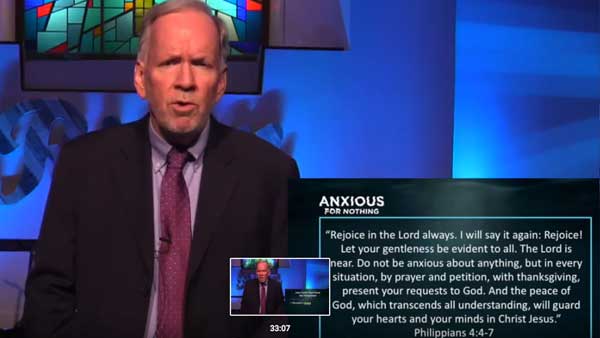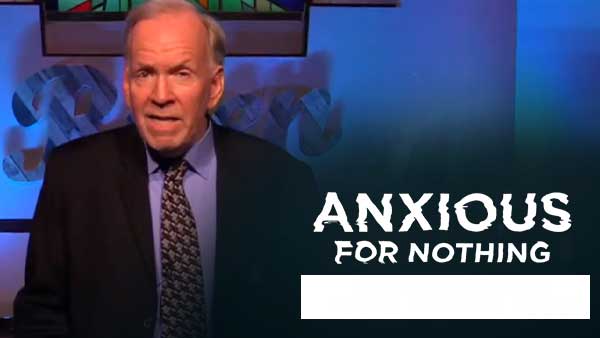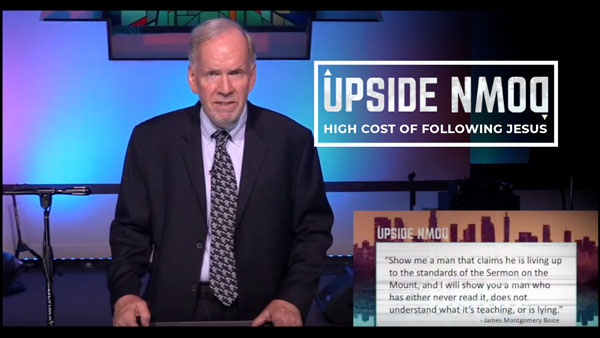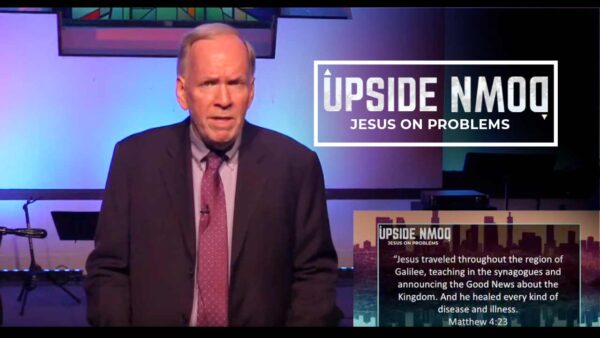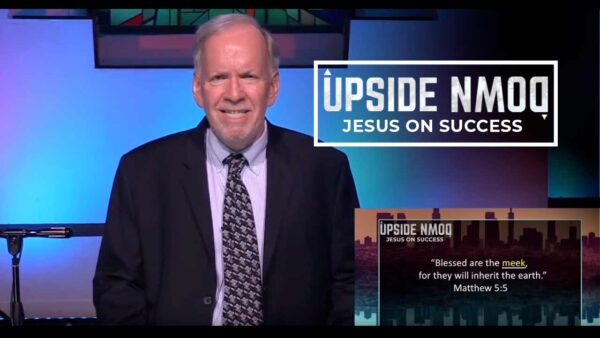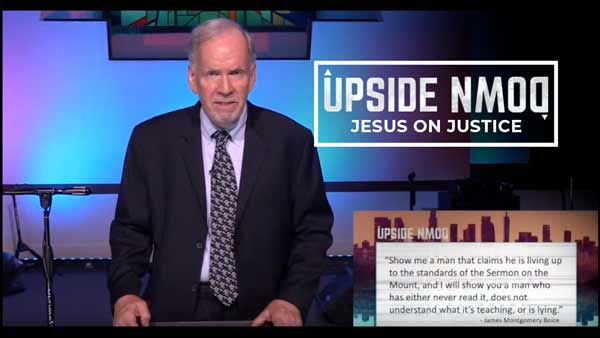Dr. Rick Mandl - October 3, 2020
Forgiving Means Forgetting
Sermon Manuscript: Dumb Things Christians Say Message 3- Forgiving Means Forgetting
Sermon preached by Dr. Rick Mandl, Eagle Rock Baptist Church, October 3 & 4, 2020
Recorded in Los Angeles, CA.
Hey church family, it’s great to be with you as we come together in worship. As we do that, I wanted to start off on a personal note. All of us have people in our lives that God has used to influence us, to mold us, and to shape us to become the people who we are today. One of those people in my life, is the man whose picture you see on the screen... Al Seymour. He is my wife’s father, which would make him my father-in-law, and he has been the patriarch of our family for many years. About a week ago, at the age of 88, the Lord called Al home. Those who are among the oldest of the old-timers here at Eagle Rock Baptist, remember Al from back in the 70’s when he was the Worship Director here. Al loved music, he loved people, and most importantly he loved his Lord and Savior Jesus Christ. And so we rejoice, that Al is with him now. Losing a loved one is always difficult, even when, as was the case here, you were expecting their passing.
Each of us in our family, will miss different things about Al. To me he was such an encourager. He was my biggest cheerleader. Even during this pandemic, while home-bound in hospice care, he would regularly tell me how much he enjoyed watching our services, via live-stream, like you are doing are right now. Al was one of those people who always focused on the positive. Was always encouraging. Always had good things to say about others. I’m going to miss him. I’m looking forward to seeing him again. And I’d appreciate your prayers for those he leaves behind. For his wife Ada. His three children – my wife Judy, and her sister Janet, and her brother Scott, his grandchildren, his great-grandchildren, and his many, many friends.
Whenever someone who knew Jesus dies, we celebrate their graduation into glory. While at the same time mourning their passing. As Christians we grieve, but it’s a different kind of grief. Because we have the hope of a reunion with those we love, who have gone on ahead of us into heaven – and wait to welcome us there when we arrive. And we thank God for that. Would you pray with me?
Lord, someone has correctly said, that as Christians, the older we get the more precious heaven becomes to us, because you is populating it with more and more people that we know and love that we look forward to seeing again. Father thank you for the Christian hope . . . Thank you that because Jesus Christ conquered death, we can be conquerors also. I thank you for the life of Al Seymour. For what he meant to this church. For what he meant to other churches in which he ministered. For what he meant to all of those who knew and loved him. I pray that you would comfort those who were closest to him. I pray that the hope of heaven would become more real to them now, because that’s where he is, and that’s where we look forward to one day being. I ask this in the name of the one paid the price so that we could have homes heaven – the one who is preparing those places for us there right now. I ask it in Jesus name, Amen.
Today we’re continuing our series. . . Dumb Things Christians Say. And the Dumb Thing We’re Looking at Today is that . . . "Forgiving Means Forgetting." And closely tied to this is what you might call "The Myth of a Forgetful God." This is the myth that basically says that when you confess a sin – God forgets it. He can’t recall it. It’s as though it never happened. Where does this idea come from?
Well it comes from the Bible. Or to be more accurate a misunderstanding of a couple of verses in the Bible. There is a promise in Jeremiah 31:34 that is repeated again in Hebrews 8 that where God, in reference to our sins, and his forgiveness says . . . “And I will forgive their wickedness, and I will never again remember their sins.” Some Christians, upon reading that will tell you that when it says that “God will never again remember our sins,” It literally means that means that he can’t recall them. The idea is that God somehow gets spiritual amnesia when it comes to our sins. But is that really true?
Because the Bible makes it clear that God knows ALL things. He is omniscient – which means he knows everything, past, present, and future. And so it would be strange if God could not remember our sins, when we can, because that would mean, that at least in this one regard, that we would know more than he does. If you dig a little deeper into this verse, you’ll discover that this is not describing a process by which God can no longer recall something. When the Bible uses the word “remember” – it often does so in a relational sense of the term. An example of this would be in Genesis 8. After God flooded the earth, we’re told that, “But God remembered Noah and all the wild animals and livestock with him in the boat. He sent a wind to blow across the earth, and the floodwaters began to recede.” God remembered Noah. Now does that mean that an angel had to tap God on the shoulder, and say “Hey, did you forget about Noah?” While you’re flooding the earth, he’s sitting on a boat waiting for you to turn the faucet off. And God says, ‘Oh yeah, you’re right. Now I remember Noah.” That is actually NOT what that verse means What it means is . . . That NOAH was on God’s mind. That God was going to renew his relationship with Noah.
When the Bible tells us that God doesn’t “remember” our sins, it means that our sins are not on his mind. They don’t prevent us from having a relationship with God. When the Bible talks about “forgiving our sins” it literally means to “cancel out a debt.” When the Bible says that God “Forgives our sins” or “doesn’t remember our sins.” It means that he has cancelled the debt that our sins owed.
Jesus affirms this definition in his most famous teaching on forgiveness. It’s the Parable Of The Unmerciful Servant – Matthew 18:21-35. And this teaching was prompted by a question that was asked by Jesus’ disciple Peter. He asks Jesus, “Lord, how often should I forgive someone who sins against me? Seven times?” (Matthew 18:21). It’s a great question. How often should you forgive somebody who has sinned against you? Some people will say, “Once." I’ll give you one Mulligan, after that we are done!” Other people will say, “Three times. You know, three strikes and you’re out!” Peter feels like he’s being pretty generous when he suggests the number seven. But look at Jesus answer to him . . . Jesus said, “‘No!’ Jesus replied, ‘Seventy times seven times!’”
I don’t believe that Jesus is saying this in order to give us a specific number - - as though 490 is the limit. I believe what he’s saying is that you and I should always forgive. And He then goes on to share a parable that explains why. Jesus says, “For this reason, the kingdom of heaven can be compared to a king who decided to bring his accounts up-to-date with servants who had borrowed money from him. When he began to settle, one of his debtors was brought in who owed him ten thousand talents.” In the ancient world, one talent was the equivalent of 15 years wages for a laborer. That’s just one talent. This guy owes a debt of 10,000 talents. That’s 150,000 years of wages. Which would have taken him about 2,232 lifetimes - - - not years, but lifetimes to repay.
Here’s another way to look at it: The minimum wage in Los Angeles is $15 an hour. If you work 40 hours a week, 52 weeks a year you will make $31,2000 dollars before taxes. If you multiply that times 150,000 years, you’re looking at a debt of 4 billion 680 million dollars and change. Any way you slice it that is a massive amount of money. So, the next part of the story makes sense. It tells us that this debtor. . . “He couldn’t pay, so the king ordered that he, his wife, his children, and everything he owned had to be sold to pay the debt…” “But the man fell down before the king and begged him, ‘Oh sir, be patient with me and I will pay it all.’ Then the king was filled with pity for him, and he released him and forgave his debt.”
It’s an amazing story. A debtor who owes someone more than $4 1/2 billion and a creditor that says, “I forgive the debt, you don’t have to pay.” It would be great if this was where the story ended, because it’s a great picture of God’s forgiveness. But this is NOT the end of the story. Jesus says that right after leaving this king’s presence, this debtor goes to one of his own servants who owes him money, and he begins to choke the guy out. He basically says to him. . . “You owe me money. I want it. And I want it now!” And the servant gets on his knees and begs for patience. He says, “I’ll pay it up in full when I can.” Sound familiar? Even though this debtor has just been forgiven a debt of more than $4 1/2 billion, he throws his own servant in prison until he can pay back his debt. Word of this gets back to the king. And here is how Jesus concludes the story. He tells us, “Then the king called in the man he had forgiven and said, ‘You evil servant! I forgave you that tremendous debt because you pleaded with me. Shouldn’t you have had mercy on your fellow servant, just as I had mercy on you?’ And then Jesus tells us . . . “Then the angry king sent the man to prison until he paid every penny. That’s what my heavenly father will do to you if you refuse to forgive others” (Matthew 18:34-35).
In this story, you can see at least three truths that apply to each one of us. The first truth is this…
- God specializes in unfair trades.
And the best example that I can think of to illustrate that is what we’re going to be remembering in a few minutes when we come to the Lord’s table. That table points us to the cross where a trade - - -theologians call it “The Great Exchange” took place. In 2 Corinthians 5:21 the Apostle Paul describes it this way. . . “God made Christ, who never sinned, to be sin for us, so that in him we might become the righteousness of God.” We come to God and offer Him sin, and in exchange he gives us his righteousness. I would classify that as an unfair trade, at the cross, Jesus Christ became sin, so that when God looks at you and me, he doesn’t see our sin what he sees is Christ’s righteousness. We give God our sin. In exchange he gives us his righteousness. God specializes in unfair trades.
In the parable that Jesus told, in Matthew 18, the king represents God, and the debtor represents each of us. Have you ever stopped to think about the fact that your sin, my sin, has amassed a debt of more than $4 1/2 billion? But when you put your faith in Christ you don’t have to pay that debt, instead Jesus pays it for you. He takes upon himself your sin, and he gives you his righteousness. He gives you the hope of eternity. He gives you membership in his forever family. Psalm 103 says . . . “God does not treat us as our sins deserve. . .” Truth Number One . . . God specializes in unfair trades.
Truth Number Two
- Forgiven people forgive people.
If you’ve been forgiven by God of more than $4 1/2 billion, then it ought to be really hard to look at someone else and think, “Yeah, but I’m not going to forgive you.” That’s Jesus whole point in this story. In the parable the king says, “Shouldn’t you have mercy on your fellow servant just as I had mercy on you?” The idea here is that when you begin to understand how much mercy and forgiveness God has shown every one of us, it’s really hard for us NOT to extend that same mercy and forgiveness to another person.
Our MEMORY VERSE for this week comes from Colossians chapter 3 and it says, “Make allowance for each other’s faults and forgive anyone who offends you. Remember, the Lord forgave you, so you must forgive others” (Colossians 3:13). It doesn’t say you “should” forgive others. It doesn’t say to forgive them if you “feel” like it. It says you MUST forgive others. This is a non-negotiable. But I can hear some of your objections! Some of the reasons why, your situation is different.
I love what C.S. Lewis said about forgiveness. He said, “Everyone says forgiveness is a lovely idea, until they have something to forgive.” Maybe that’s you right now. Maybe you’re thinking, “I love the idea of forgiveness. “I’m all for it.” But then you think about that one the person in your own life, and you go, “But they don’t deserve to be forgiven! And you don’t know the things they have done to me, and the ways they have hurt me.” And I’d say to you . . . “You’re right. I don’t have any idea what they did to you.” And I would not even begin to tell you that you should not feel as hurt as you do about what they did to you. But what I do know is that it’s possible to forgive no matter what.”
I want to show you a news clip from the bond trial of Dylan Roof. On June 9th of 2015 Roof walked into the Emmanuel African Methodist Episcopal Church in Charleston SC. He sat in on a Bible Study group and at one point he pulled out a gun and started shooting. His self-proclaimed goal was to start a race war. He killed nine people because of the color of their skin, never once pausing to notice that the color of their blood was the same color as his own. At his bond trial family members of victims were allowed to speak to him directly via video. Take a look at a little bit of what they said . . . Video- Victims of Dylan Roof Offer Forgiveness (1:49)
One of the statements that’s not in that news report was from Anthony Thompson. His wife Myra was shot and killed that day. Here’s what he said to Dylan Roof, “I forgive you. My family forgives you. But we would like to take this opportunity to call you to repent. Repent, confess, give your life to the one who matters the most, Jesus Christ, so that he can change it and change your ways, no matter what happens to you, and you’ll be okay...” Do that and you’ll be better off than you are right now.”
Where does a human being develop the capacity to forgive like that? A columnist for USA TODAY was so amazed by what he saw from those families, that the next day he wrote in a column. . . “It was neither expected nor explicable, that forgiveness. Such forgiveness is unseen in the animal world. In other words, Zebras don’t gather together to forgive the lion that killed their mother. He said “It’s unseen in the animal world, it’s illogical in the rational world, He said it is even nonsensical to common human nature. Such forgiveness is humanity at its most human, or perhaps its most divine. // /
People sometimes ask, “Do I have to forgive someone who hasn’t asked to be forgiven?” That’s a difficult question. And I think the best way to address it is to let the Bible answer it. When it comes to forgiveness, our model is Jesus Christ. Ephesians 4:32 tells us, “Be kind to each other, tenderhearted, forgiving one another, just as God through Christ has forgiven you.” Think about Jesus hanging on the cross dying. . . Do you remember that in that moment as hung dying, he looked at the crowd, he looked at his killers, and he prayed, “Father forgive them, they don’t know what they’re doing”? Let me ask you . . . How many of them had asked to be forgiven? The answer is none. Yet Jesus prayed for them. And that’s what we ought to do because Forgiven people forgive people.
When you fail to forgive, do you know who you hurt the most? You hurt yourself. Your unforgiveness hurts you. The byproducts of unforgiveness are things like bitterness and resentment and they’re toxic to your soul. Even secular researchers point this out. There are articles from secular researchers who write about the link between unforgiveness and cancer. One study found that unforgiveness is linked to higher blood pressure, depression, and a shorter lifespan. It’s not worth it.
Let’s make this personal. Is there someone in your life that you have not forgiven? Every day there’s a little more bitterness. A little more resentment. You may have what you feel are good reasons for your refusal to forgive. But when you think of the infinite mercy God has shown to each and every one of us, those good reasons don’t seem quite so good. The mercy we’ve received from God is the mercy we should extend to others. Forgiven people forgive people.
A third truth that we see in this parable is what we’re talking about today which is that . . .
- Forgiving does not mean forgetting.
One of the often-overlooked parts of this parable, is that after the king, who represents God, forgives his debtor, he clearly doesn’t forget it, because when he finds out that this debtor hasn’t been forgiving his own servant, there are consequences to pay. And this shows us that it’s possible to genuinely forgive someone but refuse to tolerate bad behavior. You can forgive your brother, but you may not end up being best friends with him.
Sometimes a person’s behavior is so destructive, and so painful, that you don’t just let it go. . . . You don’t just let bygones be bygones. Healing is a process and forgiveness takes time. . . And sometimes a restored relationship isn’t even possible. And sometimes forgetting isn’t possible. AGAIN - - - We’re not commanded to forget. We ARE commanded to forgive. Forgiveness is a choice. I can choose to forgive when I…
- Remember how much I’ve been forgiven- When it comes to forgiveness, and specifically forgiving the big hurts, I don’t believe you can give out what you haven’t received. And for that reason, the first step in forgiving others is to understand and remember how much you've been forgiven, specifically how much you've been forgiven by God. Forgiveness doesn't start with the wrong that's been done to me. Forgiveness starts with the wrong that I've done to others. Forgiveness asks, how much wrong have I done? And how much have I been forgiven? And then it seeks to show that or share that same level of forgiveness to others. Before we can go any further in this process of forgiveness, we have to get this first step.
If you're a follower of Jesus, then the truth is you recognize this. You know that you've been forgiven a whole lot. In fact, the Bible says that before you became a follower of Jesus you were dead in your sin nature but once you placed your faith in Christ, you became alive and new and living in Him. “You were dead because of your sins and because your sinful nature was not yet cut away. Then God made you alive with Christ, for he forgave all our sins” (Colossians 2:13). Don’t miss those first three words… You were dead. You were dead. Prior to Jesus, you were dead in your sins. Apart from the work of God in your life, you were dead. Apart from the work of God in your life, you were unable to receive and accept and offer forgiveness in the way that God desires for you. But thankfully the verse doesn’t end there… It goes on and says . . . “God made you alive with Christ.” This is the good news. When you placed your faith in Jesus, you became alive in Christ. And it’s then that you’ll have the desire, and the ability to forgive others as he has forgiven you. When you remember how much you've been forgiven it allows you to move forward in this process of forgiveness. That’s step one.
Step two is to . . .
- Release the individual- When a person does wrong to you or does you wrong, it may not be possible for you to forget, what they did. And that’s okay because you’re not commanded to do that. But you can choose to release that person, from the debt they owe you. You might say, "But pastor, you don’t understand. I've tried that. I've forgiven them countless times. I've gone that path. You don't understand how much they've hurt me. You don't understand the degree of pain that it's brought in my life, or what I've had to deal with because of this situation." I won’t argue that point with you. For the big hurts, this is usually not a “one and done” situation, but instead a process. Which is why I believe Jesus said, not seven times but 70 time 7. What I will tell you, is that as long as you hold on to that hurt, the bitterness that goes with it will hold on to you.
One thing that can help you in this process, is the third, and maybe the most important step. And that is, - I can choose to forgive when I . . . "Refocus on God’s grace."- Once you choose to forgive someone, don't expect that you'll be able to forget. In fact, this is one of the biggest problems with this dumb thing that Christians say - “Forgiving Means Forgetting.” For people who believe that dumb thing – that can become a roadblock to ever forgiving the person who has hurt. What I mean is if they buy into that myth that “Forgiving Means Forgiving.” They can look at the hurt that they’ve suffered. . . And if they figure it’s so big of a hurt that they would never be able to forget it . . . Well, then why forgive? Because if “Forgiving means forgetting” And they know they can’t forget. . . They why try to forgive. Don't put yourself in this bind and think, "I have to forget this."
You can't control what you forget or what you don't forget. You can control what you choose to focus on, moving forward. God invites us to focus on His grace. God wants us to see His grace, and to experience His grace, and to know it and to focus on it, so that we can move forward and experience healing in our lives. It's by God's grace that we first receive forgiveness. And it’s by God’s grace that we extend it to others. And this is why He invites us to focus on His grace, rather than focus on the pain or the hurt that we've experienced. As we do that, God is there to help us. Hebrews 4:16 tells us, “So, let us come boldly to the throne of our gracious God. There we will receive his mercy, and we will find grace to help us when we need it most” (Hebrews 4:16). Don’t miss those four words, "Grace to help us," in the last line of that verse. Grace to help us. It’s God’s grace that can give us freedom from bitterness. It's God's grace that can allow us to move forward in life, rather than get stuck in the hurt and the pain of the situation.
You can refuse to forgive, and you can be trapped and held hostage to bitterness and resentment and pain. Or you can choose to forgive, and instead, focus on God's grace and experience freedom and liberation in the way that God desires for it to be brought about in your life. The great thing about God's grace, is that it works in multiple ways. It doesn't work in one, single way. In fact, I've listed a couple ways in your life. You can write this one down. "God's grace works in my life to forgive others." God's grace works in my life to forgive others. You see, it's God that brings about His grace in our life so that we can forgive others. You say, "Man, I've been hurt so bad. I can't believe this person has done this again. Another time. Over and over. When is this ever going to end? When is this person going to learn? When are they going to make things right? When will they stop hurting me? When will this pain go away?" That's how we feel. But, you see, it's God's grace that comes into our life that allows us to forgive others, that helps us when we're ready to forgive. God's grace gives us the strength that we need, so that we can forgive others. Not only that, but God's grace works in the lives of others who need forgiveness. God's grace works in the lives of others who need forgiveness.
You see, we're all in need of forgiveness. Even that person who has done wrong to us, the one who has hurt us, is in need of God's forgiveness. That person deserves God's forgiveness as much as you or I deserve God's forgiveness. If you're a follower of Jesus today, then you recognize this. You understand that you've received the fullness of God's forgiveness and His grace. You placed your faith in Jesus like we talked about earlier, and you became alive in Christ. You know the fullness of God's grace and forgiveness.
If you're not a follower of Jesus, then you're in desperate need of God's forgiveness. You see, that's the starting place. We've all done wrong. We call that sin. We've all messed up, every person in this room, myself included. We've all hurt someone else. We've hurt ourselves. We've done things our own way. It's created problems. We've all sinned. We were dead in our sins, like we talked about earlier. When you place your faith in Christ, you not only receive of forgiveness.
You see, God sent His son, Jesus, to die on the cross to show us how much we can be forgiven, and He raised Him back up to life so that we, in turn, can offer forgiveness to others. If you've not yet placed your faith in Jesus, then you are in need of God's ultimate forgiveness. It starts when you recognize that Jesus came to this earth. That He died on the cross for you. That He paid the price for your sins. That He took your place, to show you how much you can be forgiven. That He was raised to life again so that you could have a new life, so that you could, in turn, offer forgiveness to those who have hurt you, to those who have offended you. It's in this forgiveness in Jesus that we're able to offer forgiveness to others. Let’s thank him for that as we go to him in prayer. . .
Recorded in Los Angeles, CA.
Scripture References: Colossians 3:13, Jeremiah 31:34, Hebrews 8:12, Genesis 8:1, Matthew 18:21-35, 2 Corinthians 5:21, Psalms 103:12, Matthew 18:33, Colossians 2:13, Hebrews 4:16
From Series: "Dumb Things Christians Say"
People have a lot to say, these days. On social media and among friends and family, we share opinions and advice freely. But sometimes Christians toss around statements that aren't exactly helpful or even biblically true. In this six-week series we’ll look at some of those spiritual urban legends and contrast them with what God’s Word actually says.

